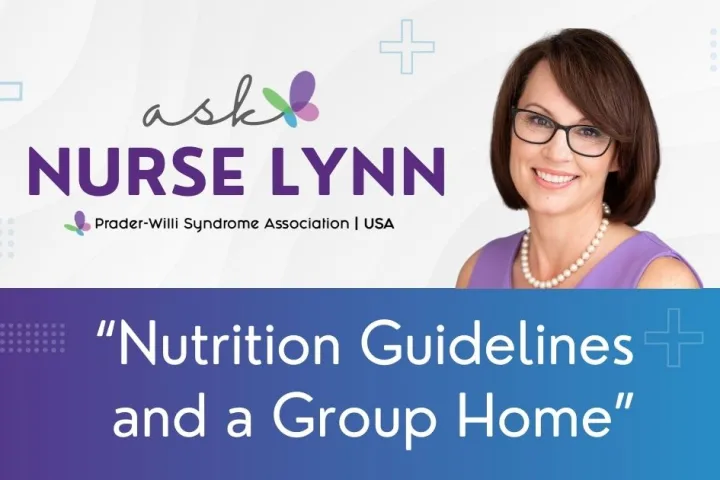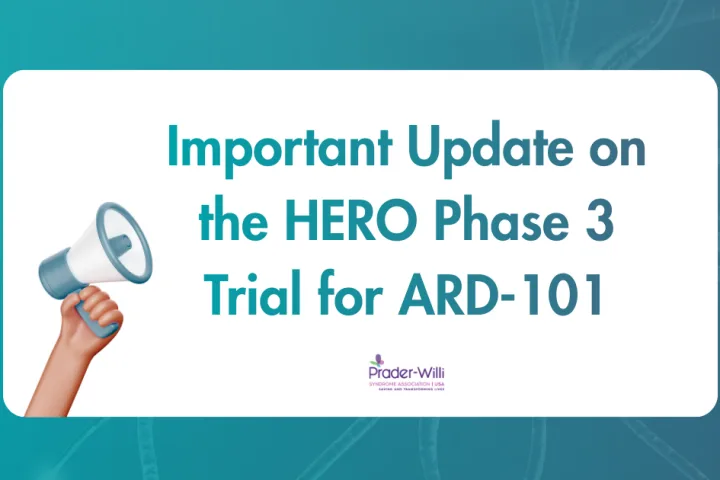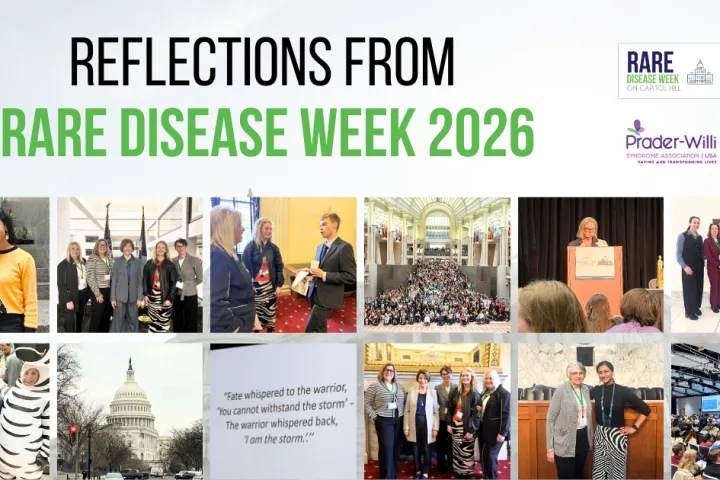One of the most difficult challenges parents face is managing their child’s behavior. Whether it occurs at home, at school, or in a residential care setting, problematic behavior is one of the most frequent reasons parents and providers call PWSA (USA) for help.
The first step to effectively manage behavior is to identify the problematic behavior; it should be defined in clear, observable, and measurable terms. Often, we (the PWS community as a whole) use the term “meltdowns” to describe a challenging behavior. However, a “meltdown” for one individual can look very different in individual. Be specific in your description. For example, sitting on the floor crying while swinging his or her arms and legs to hit and kick those within reach.
Once the challenging or problematic behavior has been defined, explore the ABCs:
- Antecedents
- Behavior
- Consequences
A
ntecedent: What occurs before the problematic behavior occurs that either increases or decreases the likelihood of the behavior occurring again. Often antecedents are referred to as “triggers.” Identifying the antecedent will help you prevent the problematic behavior in the future.
Behavior: The specific action you are trying to increase or decrease.
Consequence: What occurs immediately following the behavior. Consequences, both positive and negative, affect the likelihood of the behavior occurring again.
To learn more about managing behavior watch PWSA (USA)’s NEW video Positive Behavior Support: Making It Work For You and Your Child.
In 20 power-packed minutes, you will learn:
- The meaning of behavior and positive behavior support
- How to engage in supportive communication with your child
- The importance of implementing structure
- The need for clear expectations and the value of planning
- Practical tips for creating positive behavior reinforcements and outcomes
- How to positively respond to a “meltdown”
- How to start a positive behavior support plan
- And so much more





 Perry A. Zirkel has written more than 1,500 publications on various aspects of school law, with an emphasis on legal issues in special education. He writes a regular column for NAESP’s Principal magazine and NASP’s Communiqué newsletter, and he did so previously for Phi Delta Kappan and Teaching Exceptional Children.
Perry A. Zirkel has written more than 1,500 publications on various aspects of school law, with an emphasis on legal issues in special education. He writes a regular column for NAESP’s Principal magazine and NASP’s Communiqué newsletter, and he did so previously for Phi Delta Kappan and Teaching Exceptional Children. Jennifer Bolander has been serving as a Special Education Specialist for PWSA (USA) since October of 2015. She is a graduate of John Carroll University and lives in Ohio with her husband Brad and daughters Kate (17), and Sophia (13) who was born with PWS.
Jennifer Bolander has been serving as a Special Education Specialist for PWSA (USA) since October of 2015. She is a graduate of John Carroll University and lives in Ohio with her husband Brad and daughters Kate (17), and Sophia (13) who was born with PWS. Dr. Amy McTighe is the PWS Program Manager and Inpatient Teacher at the Center for Prader-Willi Syndrome at the Children’s Institute of Pittsburgh. She graduated from Duquesne University receiving her Bachelor’s and Master’s degree in Education with a focus on elementary education, special education, and language arts.
Dr. Amy McTighe is the PWS Program Manager and Inpatient Teacher at the Center for Prader-Willi Syndrome at the Children’s Institute of Pittsburgh. She graduated from Duquesne University receiving her Bachelor’s and Master’s degree in Education with a focus on elementary education, special education, and language arts. Evan has worked with the Prader-Willi Syndrome Association (USA) since 2007 primarily as a Crisis Intervention and Family Support Counselor. Evans works with parents and schools to foster strong collaborative relationships and appropriate educational environments for students with PWS.
Evan has worked with the Prader-Willi Syndrome Association (USA) since 2007 primarily as a Crisis Intervention and Family Support Counselor. Evans works with parents and schools to foster strong collaborative relationships and appropriate educational environments for students with PWS. Staci Zimmerman works for Prader-Willi Syndrome Association of Colorado as an Individualized Education Program (IEP) consultant. Staci collaborates with the PWS multi-disciplinary clinic at the Children’s Hospital in Denver supporting families and school districts around the United States with their child’s Individual Educational Plan.
Staci Zimmerman works for Prader-Willi Syndrome Association of Colorado as an Individualized Education Program (IEP) consultant. Staci collaborates with the PWS multi-disciplinary clinic at the Children’s Hospital in Denver supporting families and school districts around the United States with their child’s Individual Educational Plan. Founded in 2001, SDLC is a non-profit legal services organization dedicated to protecting and advancing the legal rights of people with disabilities throughout the South. It partners with the Southern Poverty Law Center, Protection and Advocacy (P&A) programs, Legal Services Corporations (LSC) and disability organizations on major, systemic disability rights issues involving the Individuals with Disabilities Education Act (IDEA), Americans with Disabilities Act (ADA), and the federal Medicaid Act. Recently in November 2014, Jim retired.
Founded in 2001, SDLC is a non-profit legal services organization dedicated to protecting and advancing the legal rights of people with disabilities throughout the South. It partners with the Southern Poverty Law Center, Protection and Advocacy (P&A) programs, Legal Services Corporations (LSC) and disability organizations on major, systemic disability rights issues involving the Individuals with Disabilities Education Act (IDEA), Americans with Disabilities Act (ADA), and the federal Medicaid Act. Recently in November 2014, Jim retired.